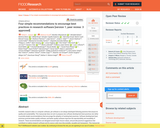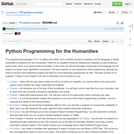
Scientific research relies on computer software, yet software is not always developed following practices that ensure its quality and sustainability. This manuscript does not aim to propose new software development best practices, but rather to provide simple recommendations that encourage the adoption of existing best practices. Software development best practices promote better quality software, and better quality software improves the reproducibility and reusability of research. These recommendations are designed around Open Source values, and provide practical suggestions that contribute to making research software and its source code more discoverable, reusable and transparent. This manuscript is aimed at developers, but also at organisations, projects, journals and funders that can increase the quality and sustainability of research software by encouraging the adoption of these recommendations.
- Subject:
- Applied Science
- Computer Science
- Information Science
- Material Type:
- Reading
- Provider:
- F1000Research
- Author:
- Alejandra Gonzalez-Beltran
- Allegra Via
- Andrew Treloar
- Bernard Pope
- Björn GrüningJonas Hagberg
- Brane Leskošek
- Bérénice Batut
- Carole Goble
- Daniel S. Katz
- Daniel Vaughan
- David Mellor
- Federico López Gómez
- Ferran Sanz
- Harry-Anton Talvik
- Horst Pichler
- Ilian Todorov
- Jon Ison
- Josep Ll. Gelpí
- Leyla Garcia
- Luis J. Oliveira
- Maarten van Gompel
- Madison Flannery
- Manuel Corpas
- Maria V. Schneider
- Martin Cook
- Mateusz Kuzak
- Michelle Barker
- Mikael Borg
- Monther Alhamdoosh
- Montserrat González Ferreiro
- Nathan S. Watson-Haigh
- Neil Chue Hong
- Nicola Mulder
- Petr Holub
- Philippa C. Griffin
- Radka Svobodová Vařeková
- Radosław Suchecki
- Rafael C. Jiménez
- Rob Hooft
- Robert Pergl
- Rowland Mosbergen
- Salvador Capella-Gutierrez
- Simon Gladman
- Sonika Tyagi
- Steve Crouchc
- Victoria Stodden
- Xiaochuan Wang
- Yasset Perez-Riverol
- Date Added:
- 08/07/2020
